 The Cajun Cheesehead Critic loves 1980’s Jane Austen’s Pride and Prejudice. Here’s why.
The Cajun Cheesehead Critic loves 1980’s Jane Austen’s Pride and Prejudice. Here’s why.
By Jack Caldwell
Greetings, everyone. Jack Caldwell here.
I’m just gonna lay it on the line:
1980’s “Jane Austen’s Pride and Prejudice” is the best adaptation of Pride and Prejudice ever filmed to date. Period.
Oh, wait? You want proof? I got proof. So, here we go.
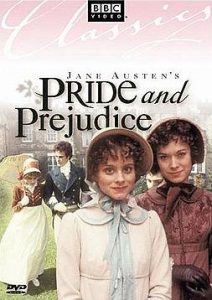 Script – Absolutely true to the novel. The humor, the pathos, the drama—it’s all there, particularly the humor. This is laugh-out-loud funny at times. Running 265 minutes (almost 4½ hours), hardly anything has been left out, and hardly anything has been added. Just about the only thing the director left out I wish they hadn’t was Elizabeth’s defense of her choice to marry Darcy in response to her father’s disbelief. But really, somehow, one forgets that the director did that.
Script – Absolutely true to the novel. The humor, the pathos, the drama—it’s all there, particularly the humor. This is laugh-out-loud funny at times. Running 265 minutes (almost 4½ hours), hardly anything has been left out, and hardly anything has been added. Just about the only thing the director left out I wish they hadn’t was Elizabeth’s defense of her choice to marry Darcy in response to her father’s disbelief. But really, somehow, one forgets that the director did that.
There were a couple of wonderful insertions, particularly with life at the Hunsford parsonage. And my favorite line by Elizabeth: “I have a mind amazed at its own discomposure.” Yes, Miss Austen didn’t write it, but she should have. It’s wonderful.
It also moved some of the dialogue between characters. For example, the Hursts utter statements at Pemberley made in the novel by Mr. Bingley at Netherfield, but it does not take way from the plot or feel.
This version stands out by voicing the inner thoughts of Elizabeth. Like the novel, the mini-series’ POV is almost always hers. Having us hear what Elizabeth is thinking is a device that works very well with this production, just like it worked in the novel.
Cast – Almost perfect. Everyone looked like they do in the novel, except maybe Lady 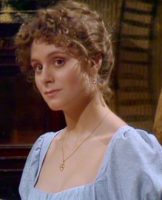 Catherine, and even that is forgivable. The stand-outs are Elizabeth Garvie as Elizabeth Bennet, David Rintoul as Fitzwilliam Darcy, Peter Settelen as George Wickham, Priscilla Morgan as Mrs. Bennet, Moray Watson as Mr. Bennet, and Malcolm Rennie as Mr. Collins.
Catherine, and even that is forgivable. The stand-outs are Elizabeth Garvie as Elizabeth Bennet, David Rintoul as Fitzwilliam Darcy, Peter Settelen as George Wickham, Priscilla Morgan as Mrs. Bennet, Moray Watson as Mr. Bennet, and Malcolm Rennie as Mr. Collins.
Garvie gives the performance of her life—all fire and charm and 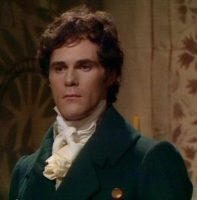 youth and impertinence and puzzlement and courage and enchantment. Like Lizzy herself, her eyes light up the room. Her jabs are thrown with such sweetness, you can understand why Darcy misunderstands her. As for Rintoul, some call his acting wooden, but I saw nothing in it. Tall and handsome, he is reserved to a fault, like Darcy is supposed to be, yet you can feel emotions simmering in him. How? Just look at his eyes. It may take a second viewing, but Rintoul’s subtle glances, eye-rolls, and glares belie his stiffness, and when he smiles at the end, you can see why the director held him back. In my mind, they are Lizzy and Darcy.
youth and impertinence and puzzlement and courage and enchantment. Like Lizzy herself, her eyes light up the room. Her jabs are thrown with such sweetness, you can understand why Darcy misunderstands her. As for Rintoul, some call his acting wooden, but I saw nothing in it. Tall and handsome, he is reserved to a fault, like Darcy is supposed to be, yet you can feel emotions simmering in him. How? Just look at his eyes. It may take a second viewing, but Rintoul’s subtle glances, eye-rolls, and glares belie his stiffness, and when he smiles at the end, you can see why the director held him back. In my mind, they are Lizzy and Darcy.
Rennie is Mr. Collins, perfectly playing him as a tall, pompous clown. Morgan’s Mrs. Bennet is shrill and silly and funny, yet you believe she loves her girls, and you love her back. You are on the side of Watson’s Mr. Bennet at the beginning, but as the mini-series continues, you lose respect for him—just as Miss Austen intended. Settelen’s Wickham is all charm and good-looks, with nothing underneath. He is no villain—he is an empty suit always seeking the easy way.
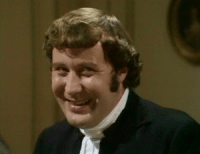
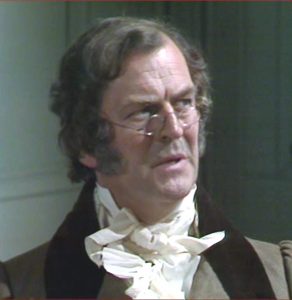
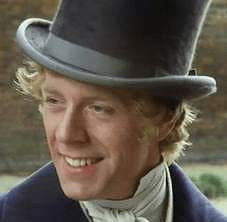
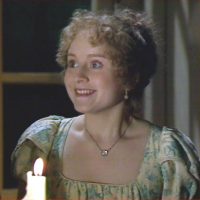 There are other performances of note. While Judy Parfitt might be too young and too tall to play Lady Catherine de Bourgh, her performance is pitch-prefect—a mixture of foolishness and arrogance. Natalie Ogle was stupid and selfish and immature as Lydia. Desmond Adams was a great plain-yet-charming Colonel Fitzwilliam. The Gardners were exactly right, in age and character, particularly Barbara Shelley as Mrs. Gardiner.
There are other performances of note. While Judy Parfitt might be too young and too tall to play Lady Catherine de Bourgh, her performance is pitch-prefect—a mixture of foolishness and arrogance. Natalie Ogle was stupid and selfish and immature as Lydia. Desmond Adams was a great plain-yet-charming Colonel Fitzwilliam. The Gardners were exactly right, in age and character, particularly Barbara Shelley as Mrs. Gardiner.
Cinematography – This was 1980 television, and the quality is a bit like your average soap opera. But the interior shots are beautiful, and they do a decent-to-outstanding job out-of-doors, particularly during the Letter Scene at Rosings. The choices for the great houses were excellent.
Costumes – I guess the BBC’s budget was tight. None of the costumes will knock you out. But they were consistent with the period of the Early Regency.
Music and Sound – I include this together. There is very little music during the film. Mostly you hear ordinary natural sounds, such as the wind, birds, horses, shoes against the gravel, and the like. I enjoyed it.
Overall Impression – This is as close to having Miss Austen’s work on film as you’re going to get. It is funny, touching, and engrossing. You see Elizabeth grow and mature after The Hunsford Letter—something other adaptations leave out.
The small touches get me:
- Mrs. Bennet’s outrage at Darcy’s insult of Lizzy at the Assembly.
- Darcy grimacing at Lady Catherine.
- Darcy walking off into Rosings’ fields as Lizzy reads The Letter, the words in Darcy’s voice.
- Anne de Bough unexpectedly taking Lizzy’s hands in farewell at Rosings.
- The beautifully filmed fireplace scene at Longbourn, as Lizzy muses over the faults of her parents.
- Darcy and Georgiana rolling their eyes at Caroline’s latest idiocy at Pemberley.
- Lizzy, Jane, and Mrs. Bennet working together, convincing Mr. Bennet to allow the newly-married Wickhams to visit.
Did they make choices I question? Sure. For example, Lizzy’s confrontation with Lady Cat 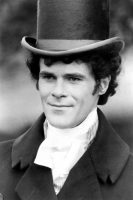 is held inside Longbourn, not outside. I guess they thought the camerawork would be better inside, and the ladies did a fabulous job, but one cannot help but wonder how great the scene would have been if it had been done as written. Having Elizabeth run from the Lambton inn to Pemberley after getting the letter from Jane about Lydia was, IMHO, stupid.The transitions between scenes could have been smoother.
is held inside Longbourn, not outside. I guess they thought the camerawork would be better inside, and the ladies did a fabulous job, but one cannot help but wonder how great the scene would have been if it had been done as written. Having Elizabeth run from the Lambton inn to Pemberley after getting the letter from Jane about Lydia was, IMHO, stupid.The transitions between scenes could have been smoother.
However, the most glaring mistake in the film was the director’s decision to have Rintoul play Darcy a bit too stiffly. His smile and relaxation after the Second Proposal shows what should have been more evident at the Pemberley scenes.
Bottom line: This is the standard by which all other adaptations must be judged. Period.
Get it. Watch it. And watch it again. You won’t be sorry.
Until next time, this has been the Cajun Cheesehead Chronicles. Happy New Year!
It takes a real man to write historical romance, so let me tell you a story…

22 comments
Skip to comment form
I whole heartily agree this adaption is fabulous . David Rintool is a great Darcy to his lovely Elizabeth great stuff.
Author
Thank you, Terri. As you can see, I agree! Happy New Year!
What little I’ve seen of the 1980 impressed me, and I look forward to watching it. I think that I’ll probably like all the versions for different reasons. Some are more true, but then there’s the 1940 which was still enjoyable in spite of out of time costumes, and Elizabeth Bennet refusing to dance with Darcy and then turning around and dancing with someone else.
Enjoyed your post, Jack, and appreciated your comments. Have a lovely day. 🙂
Author
I encourage you to watch the whole thing. The scenes at Netherfield are particularly enjoyable, and the Letter Scene is the best ever filmed. Happy New Year!
Rintoul was always great at playing upper class/professional characters.
You have to grin and bear the less than optimal production values.
As for the costumes, a quick look in IMDb is enlightening. It seems like the costumes for Regency productions made the rounds. A gown X wears in P&P was also worn by Y in Vanity Fair.
Author
Yep. Just like the 1940 version! Happy New Year!
Yes, yes and yes. My favourite for all those reasons and I still don’t understand the run of Elizabeth to Pemberley
Author
Me either. Happy New Year!
Nice bringing us back to this version. I saw it when it first came on PBS and loved it. My favorite was Elizabeth Garvey because she sang and it was beautiful. Plus her eyes were so expressive. Now I guess I’ll go back and watch again today.
Author
Good for you! Enjoy! Happy New Year!
Yes, the outdoor scene reading ‘The Letter’ was beautifully done and I still see in vividly in my mind. I always look at it as if I am at the theatre watching a play. It helps me ‘view’ it better. Time to dust it off and watch it again in the New Year!
Happy New Year!
Author
The same to you, Carole!
I’m really sorry Jack but I can’t agree about David Rintoul being the best Darcy. I watched it once and his performance grated on me so much that I really couldn’t appreciate anything else. I also can’t make myself watch it again. But I do know that some people do enjoy this version so I will just agree to disagree and stick with my two favourites of 1995 & 2005.
Thank you for sharing your thoughts on the different versions.
I’m with Glynis.; word for word, she speaks my mind. I find your favourite version unwatchable – except for the lovely Lizzy and the final scene. Many people love this version, perhaps because it’s the version they saw first. Except for Lizzy, none of the characters are as I imagined them, and I’ve been reading P&P for many decades. My perfect version is the 1995, even though Jennifer Ehle is too porcelain in it for my taste; I prefer 2005’s Elizabeth, Kiera Knightly .She seems more natural. I do also like the 2005 version, it’s good but second best , Obviously my humble opinion and yours will never meet; your reasons are mostly subjective and so are mine; both are equally valid.
My problem with that version is that it cleaves too closely to the novel. For example, we shouldn’t need to hear Elizabeth’s inner voice because TV is a visual medium, and other more visual means should be used to convey the meaning (scoff at Darcy jumping in a pond all you want, but that sort of thing is the difference between a TV show and a book on tape).
A visual medium should actually be visual. I believe that this is where the 1980 version fails. It wasn’t so much adapted for TV as recited for TV.
There’s my 2 cents. 😉
Oh, I agree completely This has always been my favorite movie version as I feel it is closest to canon. It always amazes me the creative license directors take in changing the genius of Austen simply to make it appeal to the modern audience. Nope, that doesn’t work for the purists. I enjoy the beauty of those movies… you can’t deny that; however, I still go back to this one as my Gold Standard. Thanks for this post.
Jack, I agree that on a while this adaptation is excellent, but in my opinion Rintool is too anamatonic. I am sorry, but that is how I view him.
I enjoyed reading that very much, Jack, and agree with it all! I watched it on PBS almost 40 years ago (!!) and bought it on VHS as soon as it was available. I have probably watched it around 10 times already, but you have inspired me to dig it right back out and watch again.
I have always thought that version is the most accurate so I am happy to read of your thoughts here. Thanks for sharing. I have all the versions, even the 1940’s one…which is laughable! Happy New Year, Jack.
Accuracy aside, this has been my fave version too. I have NOT seen any better in terms of how naturally it aligns with Jane Austen’s depiction of each character. Yes, there has been a tremendous amount of criticism and dislike of David Rintoul in that role. Perhaps he portrayed him too well being despicable, haughty, arrogant, icy, beyond stiff-upper-lip, no smile, etc… How do we know if such characters are not like that around that period of time? Perhaps we are so fallible to over-romanticizing those protagonists (in this case starting out as an antagonist) that we refuse to accept anyone who is NOT likable to play such roles. Especially the way Hollywood helps to portray, certain “personalities” are prescribed into a particular role.
Comparatively speaking, the 1980 version is the least lavish in set and costumes. But the performance steered me away from such distractions and immersed deeply into each character that it did not matter. In fact, after one viewing of 1995 version, I am totally done. It had the most lavish settings, exaggerated costumes, senseless women’s attire, contrived acting – Lizzy in particular, nothing worth reminiscing. Sorry, Firth did not cut it for me. 2005 version was alright for a compressed 135 minutes with liberties. Forget the 1940 version – too Hollywood! I love the 2016 version P&P&Zombies!!! I really think that Lily James and Sam Reilly and the rest of the cast would have done very well in an original script.
Overall, this was the best adaption of the novel to date. Just tell it like it is! Nothing more, nothing less.
Thanks for this article.
I agree with everything except Rintoul. I know people love to push other adaptations, but this version of Lizzy Bennet is absolute perfection. But Rintoul was so stiff it became a distraction for me. Even the scenes when he’s aaaalmost likable, I kinda want to shove him and tell him to loosen up. (I know, that’s me just being too American) 😉
Besides, I’m always gonna have a huge and ridiculous soft spot for Colin Firth. That dimple just kills me. If you don’t believe me, I’ll honestly admit it was the first thing I noticed about my own husband when we first met. Is that a shallow reason? Absolutely. However, I think he also gets the balance of stiff, but still human.